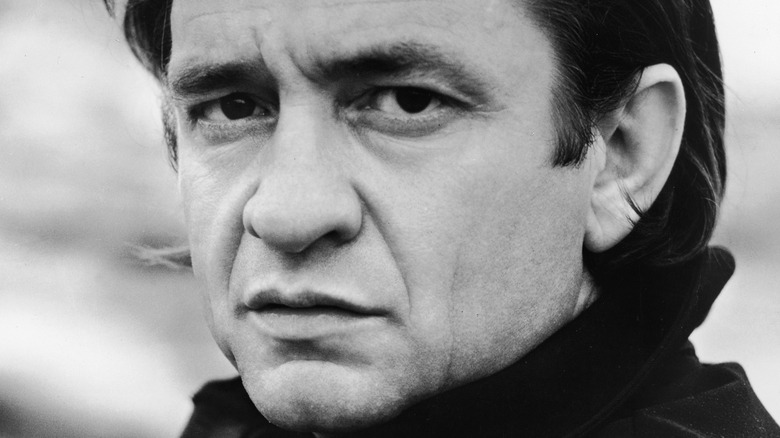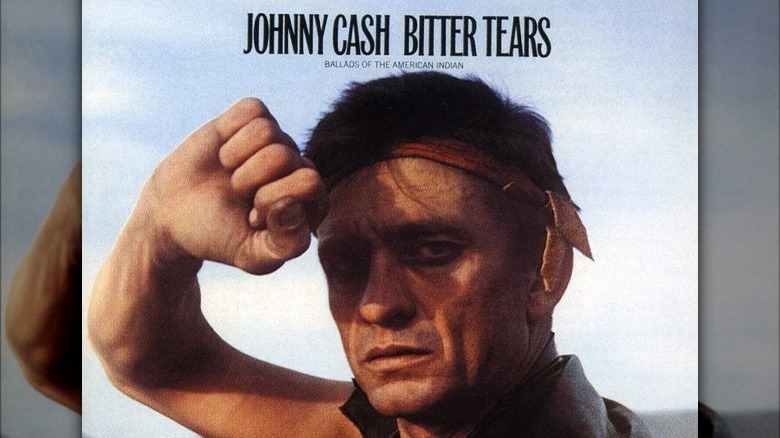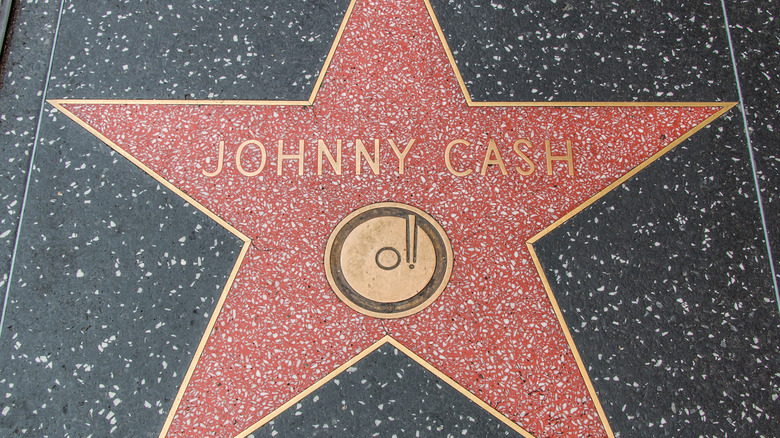Johnny Cash's Career Was Almost Destroyed For Standing Up For Native Americans
Johnny Cash was known as the "Man in Black" for always wearing the somewhat somber color. It wasn't just a style choice. In the lyrics from the song "Man in Black," he wrote, "I wear the black for the poor and the beaten down / livin' in the hopeless, hungry side of town / I wear it for the prisoner who has long paid for his crime / but is there because he's a victim of the times" (via the Johnny Cash Trail).
Among those he closely identified with were Native Americans. So in 1964, he recorded "Bitter Tears: Ballads of the American Indian," which was a concept album advocating for the indigenous people who had suffered horribly under the U.S. government through broken treaties, forced relocations, and genocide.
The album included such classics as "The Ballad of Ira Hayes," penned by Cash's friend, the folk singer Peter La Farge, about Hayes, a member of the Pima and a Marine who helped raise the American flag over Iwo Jima during World War II, per Billboard. In another song, "As Long As the Grass Shall Grow," Cash wrote about the loss of the Seneca people's lands to make way for a dam. But if Cash thought his record company, Columbia Records, or the country radio stations that acted as gatekeepers would welcome his new album, he was sorely mistaken.
Johnny Cash was the victim of soft censorship
In 1964, the Civil Rights movement was gaining momentum, as was the racist backlash, and jumpy record executives weren't keen on promoting an album that shone a bright light on the U.S. government's long history of mistreatment of Native Americans. "This fraught political environment filled the executive suites at Cash's label and programming booths of many radio stations with fear," Antonino D'Ambrosio, a documentary director and the author of "A Heartbeat and a Guitar: Johnny Cash and the Making of Bitter Tears," told the ACLU.
While Columbia Records stuck to its contractual obligations, it didn't promote the album and only sent out a minimal amount of records, in what D'Ambrosio called a form of "soft censorship," per ACLU. Still worse, in a time when radio stations had an inordinate amount of power over what music the public got to hear, many radio station managers flatly refused to play "The Ballad of Ira Hayes," according to Billboard.
For Johnny Cash, releasing this kind of album and its first single, "The Ballad of Ira Hayes," was a risky career move. He was coming off a chart-topping success with "Ring of Fire," from the album "I Walk The Line," but that didn't guarantee his fans wouldn't react in the same way the record executives and radio stations did, per Billboard.
Johnny Cash fights back
Johnny Cash had wanted to make "Bitter Tears" for years. "I dove into primary and secondary sources, immersing myself in the tragic stories of the Cherokee and the Apache, among others, until I was almost as raw as Peter," he recalled, per "Sound Clash: Listening to American Studies." "By the time I actually recorded the album I carried a heavy load of sadness and outrage." When he learned of the backlash, Cash took out a full page in Billboard aimed at the radio stations. "D.J.'s — station managers — owners, etc., where are your guts?" Cash asked in the ad.
He bought back thousands of his records, put copies of the Billboard ad into each one, and drove around the country to hand deliver them to radio stations, according to Antonino D'Ambrosio (via the ACLU interview). The move paid off, "The Ballad of Ira Hayes" stayed on the country charts for more than 20 weeks and peaked at No. 3, per Records and Charts, and critics praised the album. In a syndicated music column, Grover Lewis said the album "conveys a sense of perceptiveness, anguish, and concern rarely present in the all-too-constricted spectrum of popular music," via the Fort-Worth Star-Telegram.
Native Americans also took notice. The Tuscarora people made Cash an honorary member. One of the tribal members told the Buffalo News that Cash's record "struck a responsive chord with us Tuscaroras."


